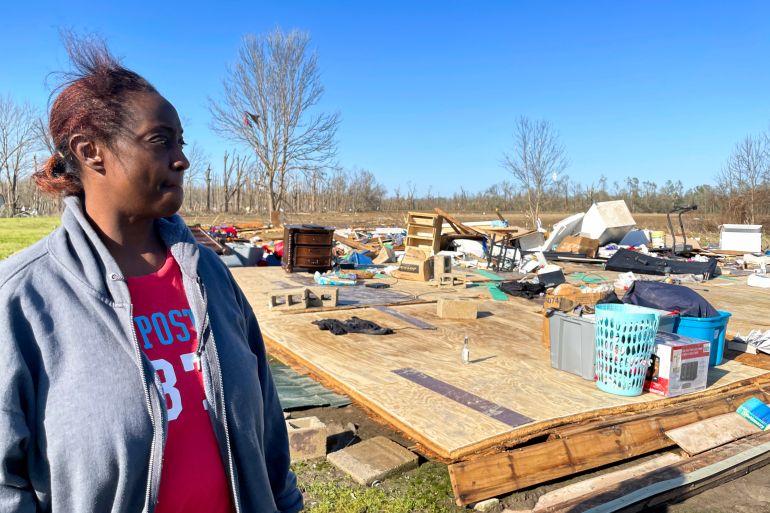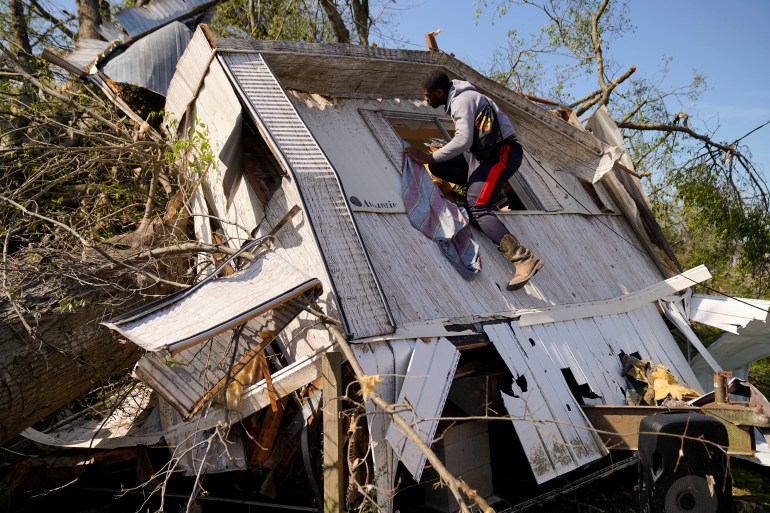Mississippi faces ‘long road to recovery’ after deadly tornadoes
Residents of storm-stricken southern US state, one of nation’s poorest, are grappling with widespread devastation.

Poverty is adding to the challenges of recovering from a massive storm that pushed through the southern US state of Mississippi late last week, killing at least 25 people and destroying entire neighbourhoods.
A tornado obliterated the modest one-storey home that Kimberly Berry shared with her two daughters in the Mississippi Delta flatlands, leaving only a foundation and some random belongings – a toppled refrigerator, a dresser and matching nightstand, a bag of Christmas decorations and some clothing.
Keep reading
list of 3 itemsAt least 23 killed in Mississippi tornado, storms
Tornadoes sweep through central United States, knocking out power
During the storm on Friday, Berry and her 12-year-old daughter huddled and prayed at a nearby church that was barely damaged while her 25-year-old daughter survived in the hard-hit town of Rolling Fork, 24km (15 miles) away.
Berry, 46, shook her head as she looked at the remains of their material possessions. She said she is grateful she and her children are still alive.
“I can get all this back. It’s nothing,” said Berry, who works as a supervisor at a catfish-growing and -processing operation. “I’m not going to get depressed about it.”
Search and rescue workers on Sunday surveyed the damage of shredded homes, flattened buildings and smashed cars in Rolling Fork, which was destroyed in the storm.
“My community is gone,” Mayor Eldridge Walker told CNN.
The devastation here in Rolling Fork is heartbreaking.
Thankful to our federal partners for being here on the ground to see the impact of this tornado.
The character and generosity of Mississippians is on full display with the countless volunteers and donations being offered. pic.twitter.com/rK4SmD8AVT
— Governor Tate Reeves (@tatereeves) March 26, 2023
United States President Joe Biden approved a disaster declaration for Mississippi on Sunday, freeing up federal assistance to help communities rebuild.
“Thankful to our federal partners for being here on the ground to see the impact of this tornado,” Governor Tate Reeves wrote on Twitter. “The character and generosity of Mississippians is on full display with the countless volunteers and donations being offered.”
But many people across the state face an uncertain future. Mississippi is one of the poorest states in the country, and the majority-Black Delta region has long been one of the poorest parts of Mississippi, a place where many people work paycheck to paycheck in jobs tied to agriculture.
Two of the counties walloped by the tornado, Sharkey and Humphreys, are among the most sparsely populated in the state with only a few thousand residents in communities scattered across wide expanses of cotton, corn and soybean fields.
Sharkey’s poverty rate is 35 percent, and Humphreys’s is 33 percent, compared with about 19 percent for Mississippi and under 12 percent for the entire country.
“It’s going to be a long road to recovery, trying to rebuild and get over the devastation,” Wayne Williams, who teaches construction skills at a vocational education centre in Rolling Fork, said as people across town hammered blue tarps onto damaged roofs and used chainsaws to cut fallen trees.
Tornadoes, a weather phenomenon notoriously difficult to predict, are relatively common in the US, especially in the central and southern parts of the country.

The National Weather Service gave Friday’s tornado, which left a trail of havoc more than 160km (100 miles) long across the state, a rating of four out of five on the Enhanced Fujita scale with winds of up to 320 kilometres per hour (200 miles per hour).
Dozens of people have been injured, and officials say the death toll could rise.
The severe weather also killed a man in Alabama when he was trapped under an overturned trailer, the sheriff’s office in Morgan County said.
Volunteers have poured in from surrounding towns, including Lauren Hoda, who traveled 112km (70 miles) to help. She spent Saturday night in Rolling Fork, bringing donations of water, food, canned goods, diapers, wipes, medicine and toothpaste from collection points.
Similar destruction plagued twister-hit Silver City, where residents were seen salvaging what they could from destroyed homes.
Berry spent the weekend with friends and family sorting through salvageable items at her destroyed home near a two-lane highway that traverses farm fields.
She said she walked to the church before the tornado hit because her sister called her on Friday night and frantically said TV weather forecasters had warned that a potentially deadly storm was headed her way. Berry said as the storm rumbled and howled overhead, she tried to ignore the noise.
“That’s the only thing that was stuck in my head was just to pray, pray and cry out to God,” she said on Saturday. “I didn’t hear nothing but my own self praying and God answering my prayer. I mean, I can get another house, another furniture. But literally saving my life – I’m thankful.”